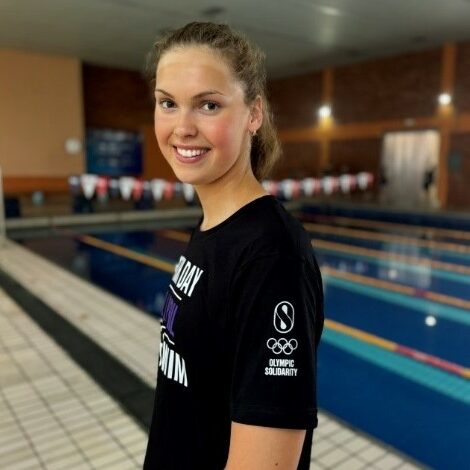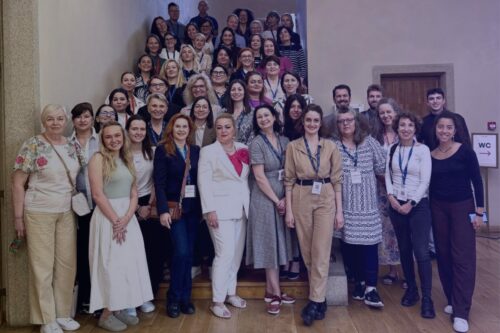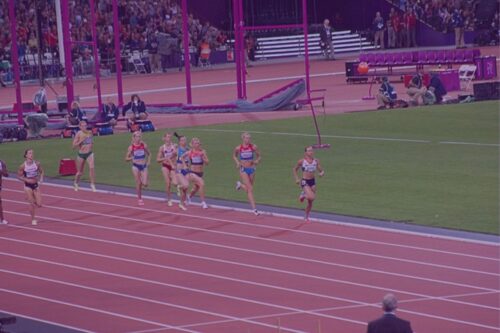Inspiring road of Bosnian-Herzegovinian swimmer Lana Pudar
Young and talented Bosnian-Herzegovinian swimmer Lana Pudar inspires many young athletes worldwide. Born on 19 January 2006 in Mostar, she has left an unerasable trace in swimming sport already by the age of 18. As the second youngest swimmer, only 15 years old, she participated in the Olympic Games in Tokyo in 2020. In 2021, she became a European junior champion in the 100m butterfly. In that same year, she won third place in the 200m butterfly discipline, bringing Bosnia and Herzegovina the first-ever medal from the World Championship in swimming. Her time is yet to come, as shown by her continuity in important international competitions, which makes her great hope for winning the first Olympic medal at the Olympic Games to be held in 2024 in Paris.

The Faculty of Physical Education and Sports of the University of Banja Luka celebrates the successes of young and talented athletes and, at the same time, advocates for the promotion of sports values and the success of all athletes. Prof. Adriana Ljubojević, leader of the SUPPORTER team at the University of Banja Luka, Faculty of Physical Education and Sports (UNIBL FFVS) had the honour to speak with Lana Pudar, whose coach is Goran Grahovac, a professor at UNIBL FFVS.
For the SUPPORTER partner Faculty of Physical Education and Sports University of Banja Luka blog, we talked with Lana about the perception of women in sports:
- In your opinion, what are the biggest prejudices or stereotypes women face in sports today?
The biggest prejudice that women in sports face is that sport is perceived much more as a male domain than as a female one. In general, there are big prejudices about male-female differences concerning gender and their ability to play sports. However, the best way to work on affirming women in sports is precisely the top results achieved by an increasing number of women. And I am especially glad that recently, in our country, women have achieved an increasing number of top results and thus stand out as holders of top sports.
- How would you describe the progress of women's participation in sports in the last few years, and what changes would you like to see in the future?
I think that recently, in many sports, the difference between men and women in top sports has been lost in terms of evaluating their results. I can see that best in swimming, and I believe the situation is similar in other sports. In the coming period, I would like to see an even greater number of women who achieve top results and thus contribute to promoting top sports.
- Do you think that women's and men's achievements are equally valued in swimming?
In my opinion, the results of both male and female swimmers are valued equally in swimming. I did not notice that men are more valued than women concerning the achieved results.
- Why would you encourage girls to play sports?
In my opinion, the reasons for playing sports are the same for both men and women. First of all, playing sports has a positive effect on human health and development. Children will feel better by playing sports and will also have greater self-confidence, especially if, after some time, they master some elements that they could not do before or if they become stronger, faster, and more durable.
- Do you think that women's participation in sports is less popular than men's?
Certainly, in certain sports, men's participation is much more popular. But I also think that there is a big difference between how it is today and how it was before, so it's definitely getting better, but you still feel the weaker treatment compared to men's sports. The public must be systematically mobilized to treat great sportswomen in the same way as sportsmen during all 365 days of the year, and not only in those five to six days when they return from a major competition with a medal.
Women in sports are not only competitors but also leaders and role models. Their contribution to the sport is immensely important, and their achievements are a source of inspiration for all of us. However, despite the progress that has been achieved, the imbalance in media coverage, the lack of equal opportunities and support, and prejudices and stereotypes are just some of the aspects of "inequality" in sports. Supporting, encouraging, and promoting women's sports are key to achieving a more inclusive and fairer sports environment.



